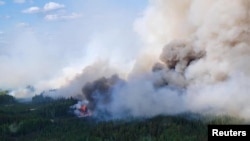Forest fires continued to burn in several areas of Canada on Thursday affecting the northeastern United States as well.
Thousands of people in Canada have fled their homes. In the U.S., many American cities are under a billowing haze.
Canada’s Federal Minister of Emergency Preparedness Bill Blair said 3.8 million hectares have already burned. He said that is about 15 times the 10-year average.
Wildfires are common in Canada. However, it is unusual for fires to burn in the eastern part of the country and the west. This has stretched the resources of Canada’s firefighters. The government has used military resources to help in the effort. Hundreds of U.S. firefighters also arrived in Canada to help, and more are expected.
On social media, Prime Minister Justin Trudeau blamed climate change. "These fires are affecting everyday routines, lives and livelihoods, and our air quality," Trudeau said on Twitter.
Some of the most severe fires are in the eastern province of Quebec. More than 11,000 people had to flee their homes there.
Wildfire season started early in Alberta last month. Large areas have burned in that western province. In the east, Nova Scotia continues to fight forest fires in several areas.
The Pacific province of British Columbia is also facing big wildfires. Temperatures were predicted to reach 33 Celsius on Thursday before thunderstorms and heavy rains arrive on Friday.
Rob Schweitzer is executive director of BC Wildfire Service, a part of the government of British Columbia. Schweitzer said lightning strikes could start more fires in dry forests. He said a lot depends on how much rain comes with the storms.
"When you get 150 or 200 strikes in one day from lightning coming through the province, it's impossible to have enough resources to suppress them all," he said.
Wildfires have eased in Alberta, the center of Canada's oil and gas industry. But more than 3,000 people remain under evacuation orders and heat warnings are in effect in the south of the province.
Smoke-forecasting website BlueSky Canada showed wildfire smoke spreading across much of the country on Thursday. The smoke is expected to worsen in the Canadian cities of Ottawa and Toronto.
In the United States, the cities of Cleveland, Ohio, and Pittsburgh, Pennsylvania are expected to have continued poor air quality. The smoke is expected to affect other cities along the East Coast of the United States, including New York City. There, Mayor Eric Adams advised people to stay inside because of the poor air quality.
I’m Jill Robbins.
Dan Novak adapted this story for VOA Learning English based on reporting by Reuters.
_______________________________________
Words in This Story
billow — v. to move as an expanding cloud or similar thing in the air
haze — n. dust or smoke that reduces the clarity of the air
routine — n. something that people do regularly or everyday
evacuation — n. the process of moving people out of an area for their safety; moving out of an area to avoid danger






Forum